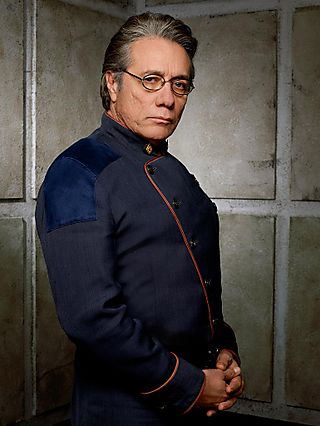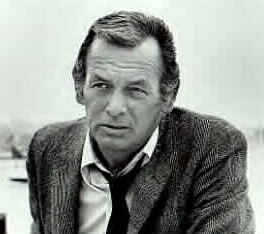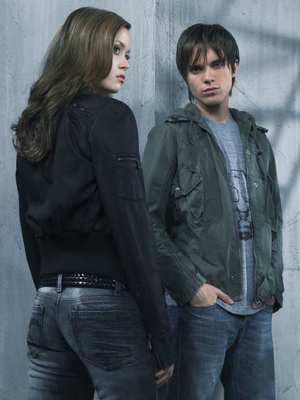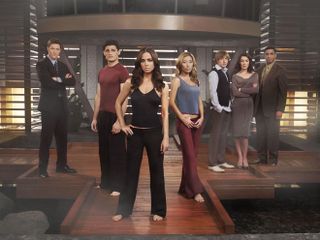
I finished writing my latest MONK novel the other day and I felt like lazing around. I’ve had a lot on my mind lately and after writing a book I didn’t feel much like reading one. So I vegged out on television…some new, some old.
The “new” were the latest episodes of BATTLESTAR GALACTICA and TERMINATOR: THE SARAH CONNOR CHRONICLES.
The BATTLESTAR episode was, astonishingly, one hour of pure exposition…mightily well-written, grandiose and flowery exposition, but exposition all the same….the dreaded “Irving the Explainer” taken to new, galactic heights by three Cylon-the-Explainers. Only a serialized series on it’s last episode or two that doesn’t give a damn anymore about drawing new viewers would dare film an episode like that and call it entertainment (though
Marc Bernardin at Entertainment Weekly thought it was so “revelatory” that it “melted my Goddamn face off.”)
The TERMINATOR episode was merely dull and totally uninvolving, relying heavily on the over-used trick of having the hero (or in this case, heroine) talk to an imaginary character. Alan Ball should be shot for doing it so effectively on SIX FEET UNDER because now every TV series has to do it. Nobody seems to have noticed that it
became a cliche three years ago and is now slipping into unintentional parody. At least the folks on GREY’S ANATOMY have raised the stakes by having the heroine fuck the character who isn’t there…oh, wait, I take it back, GALACTICA did that two seasons ago when it still had a sense of humor to go along with all of its dread and misery. The folks at TERMINATOR have forgotten what made the TERMINATOR movies so much fun…and have gotten mired in dreary angst…probably because angst is cheaper to shoot than Terminators destroying things. The John Connor character has become a morose, whiny, Excedrin headache come-to-life…but the two lady Terminators? They’re great.
The “old” TV that I watched was a private eye marathon that I staged for myself with episodes of
HARRY O starring David Janssen,
THE OUTSIDER starring Darren McGavin and
THE ROCKFORD FILES starring James Garner.

THE OUTSIDER and ROCKFORD were, essentially, the same show, about a down-and-out ex-con turned private eye in L.A. Roy Huggins created THE OUTSIDER and co-created ROCKFORD with Steve Cannell, who brought more humor to the concept. I liked all three of them very much ..not so much for the plotting, which was often weak and predictable, but for the mood and the terrific anti-private eyes at the heart of those series (and the brilliant lead actors who played them). Nobody did world-weary heroes and lovable losers like McGavin, Janssen and Garner. It’s hard to pick a favorite among these three great series, but if I had to, I guess it would be
HARRY O.
Janssen is a pleasure to watch as beach-bum Harry Orwell, riding around San Diego on the bus, tie loose around his collar, a permanently pained expression on his tan, lined face. What a terrific character. Both Rockford and Ross were tougher than they looked, but not Harry. He wasn’t tough at all. Just bone-tired and lonely…and too caring for his own good. He couldn’t even run after a bad guy or a damsel in distress, not with that damn bullet permanently stuck in his aching back. What other private eye but Harry would turn down a willing Linda Evans by saying “I can’t make love unless I’m in love…just a little.” Ross and Rockford would have bedded her in a second…out of desperation and opportunity if nothing else. Not Harry.
Sure, the plotting in
HARRY O was often lousy, but the show captured, better than any other before or since, the pure pleasure of reading a great PI novel. The show wasn’t as complex as a Ross MacDonald or even John D. MacDonald novel, but it aimed for that kind of emotional and psychological complexity…even when it pandered with a drooling psychokiller plot (starting with it’s pilot, “Smile Jenny, You’re Dead”).

Watching HARRY O, ROCKFORD and THE OUTSIDER, I realized what those old shows had over those two, recent episodes of GALACTICA and TERMINATOR. Character. Keep in mind, GALACTICA and TERMINATOR are two of my favorite shows (well, they
were). But, at the risk of sounding like an old coot blogging from his bungalow at the Motion Picture Home, I think that too often shows today confuse angst with character, dread with depth, misery with complexity. A character doesn’t have to be in endless spasms of self-loathing, denial, heart-break and agony to be someone worth watching or caring about. That’s cheap and easy “complexity” for a writer, it’s writing a character rather than creating one…and it’s a beating for the audience. Characters are more than the sum of their pain, anguish and loss…and their capacity for cruelty to themselves and others. It’s not superficial or weak writing to explore more subtle conflicts…and to season them with humor, compassion, vulnerability, and some joy. There are people I love very much who are going through very hard times…and yet they haven’t lost their sense of humor or their ability to find joy in their lives, even in their darkest moments. If anything, it’s that capacity for humor and joy that is seeing them through it.
I love (or, I should say, loved) GALACTICA and TERMINATOR…but Captain Adama and Starbuck, Sarah Connor and John Connor….in the end, they aren’t memorable characters. They feel like writerly constructs. Pain masquerading as character. They don’t live and breath the way Lt. Columbo, Tony Soprano, Archie Bunker, Adrian Monk, Al Swearingen, Mr. Spock, Mary Richards, Matt Dillon, George Costanza, or even Dexter Morgan do, to name a few. Because despite all of the dark, angst-ridden conflicts that the writers have created for them, the characters on GALACTICA and TERMINATOR are incessantly one-note: Miserable. And too often than not, they leave the viewer feeling the same way.





